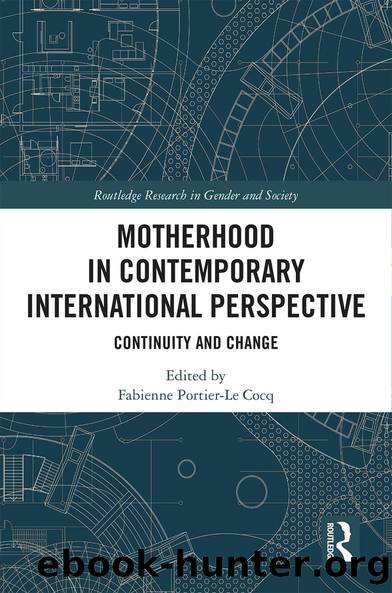Motherhood in Contemporary International Perspective by Fabienne Portier-Le Cocq

Author:Fabienne Portier-Le Cocq [Cocq, Fabienne Portier-Le]
Language: eng
Format: epub
ISBN: 9780367777739
Google: Hd8dzgEACAAJ
Publisher: Taylor & Francis Limited
Published: 2021-04-15T04:58:33+00:00
McMahon (1995) explored how working-class women are more likely to leave pregnancy and parenthood to fate. She described how middle-class and working-class women responded very differently to unprotected sex: More advantaged women tended to take emergency contraception after unprotected sex whereas more disadvantaged women were likely to wait and see if they become pregnant. This might be through not having the financial means to buy emergency contraceptive pills or the ability to access clinic provision, as well as differing expectations for career trajectories.
Most of the young women in this study reported taking proactive action with a first pregnancy mostly due to a desire to complete statutory education. They decided to abort although some miscarried in the interim. With subsequent pregnancies, the picture became more complex. It appears that through concerns regarding possible infertility, sometimes incurred by a pregnancy loss through abortion or miscarriage, and having finished statutory education that motherhood became a more desired pathway despite wider society still considering these pregnancies as early, and young motherhood stigmatised. Consequently, the young women mobilised legitimising narratives that seemed to be at odds with personal desire. They presented narratives that appeared to aim to convince the listener of their good citizenship: that they were trying to avoid pregnancy when contraceptive failure, concerns regarding infertility, or fate meant that they became pregnant, despite their efforts to avoid pregnancy. Yet at the same time, their narratives attested to being open to the possibility of pregnancy.
Similar to the young women in the Goncalves et al. study (2011), the young women used narratives of contraceptive or infertility medicalisation that enables many of them to demonstrate engagement with normative society yet also âdevelop a potent off-stage critiqueâ (p. 201) â through hints of gaps in contraceptive use or being convinced they were infertile so no contraception was used, and therefore opening up a possibility of pregnancy. Goncalves et al. (2011, p. 212) termed this âcovert resistance to normative ideologiesâ. This is akin to Foucauldian governmentality (Foucault 1984) where a space is opened up for resistance to normalised expectations, rather than that of Rose (1989) where personal desire and that of the state come to be the same.
Download
This site does not store any files on its server. We only index and link to content provided by other sites. Please contact the content providers to delete copyright contents if any and email us, we'll remove relevant links or contents immediately.
Should I Stay or Should I Go? by Ramani Durvasula(7667)
The Lost Art of Listening by Michael P. Nichols(7506)
The Rosie Project by Graeme Simsion(6413)
Beartown by Fredrik Backman(5754)
We Need to Talk by Celeste Headlee(5615)
Ego Is the Enemy by Ryan Holiday(5447)
Hunger by Roxane Gay(4928)
Suicide Notes by Michael Thomas Ford(4827)
I Love You But I Don't Trust You by Mira Kirshenbaum(3875)
Mummy Knew by Lisa James(3691)
Not a Diet Book by James Smith(3426)
Crazy Is My Superpower by A.J. Mendez Brooks(3400)
Toxic Parents by Susan Forward(3292)
Girl, Wash Your Face by Rachel Hollis(3282)
The Complete Idiot's Guide to Coping With Difficult People by Arlene Uhl(3149)
The Social Psychology of Inequality by Unknown(3031)
Name Book, The: Over 10,000 Names--Their Meanings, Origins, and Spiritual Significance by Astoria Dorothy(2987)
The Hard Questions by Susan Piver(2972)
The Gaslight Effect by Dr. Robin Stern(2793)
